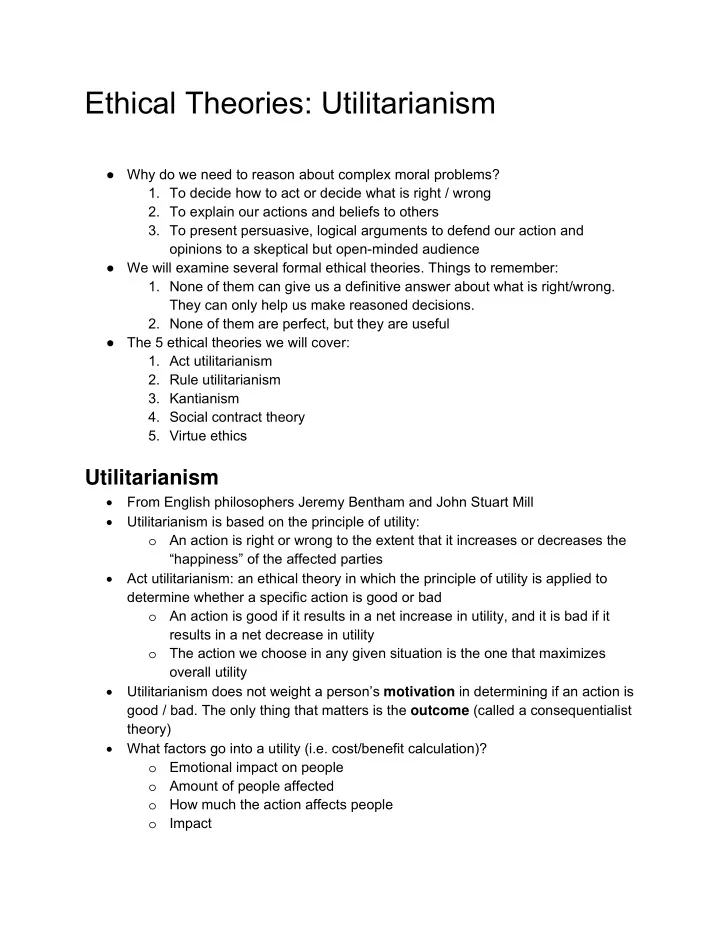

Ethical Theories: Utilitarianism ● Why do we need to reason about complex moral problems? 1. To decide how to act or decide what is right / wrong 2. To explain our actions and beliefs to others 3. To present persuasive, logical arguments to defend our action and opinions to a skeptical but open-minded audience ● We will examine several formal ethical theories. Things to remember: 1. None of them can give us a definitive answer about what is right/wrong. They can only help us make reasoned decisions. 2. None of them are perfect, but they are useful ● The 5 ethical theories we will cover: 1. Act utilitarianism 2. Rule utilitarianism 3. Kantianism 4. Social contract theory 5. Virtue ethics Utilitarianism From English philosophers Jeremy Bentham and John Stuart Mill Utilitarianism is based on the principle of utility: o An action is right or wrong to the extent that it increases or decreases the “happiness” of the affected parties Act utilitarianism: an ethical theory in which the principle of utility is applied to determine whether a specific action is good or bad o An action is good if it results in a net increase in utility, and it is bad if it results in a net decrease in utility o The action we choose in any given situation is the one that maximizes overall utility Utilitarianism does not weight a person’s motivation in determining if an action is good / bad. The only thing that matters is the outcome (called a consequentialist theory) What factors go into a utility (i.e. cost/benefit calculation)? o Emotional impact on people o Amount of people affected o How much the action affects people o Impact
o Timeframe: immediate vs delayed impact What are some of utilitarianism’s strengths? o Practical – maximize utility is straightforward provided utilities are accurate Measure the positive and negative effects of each action Choose the action with the most positive effects o Forces the decision maker to focus on happiness / benefit o General, can be adapted to many scenarios Allows us to be flexible in many circumstances o Can allow you to look beyond self-interest and consider the interests of others affected by our actions What are some of the weaknesses of act utilitarianism? o Hard to come up with utility numbers What does it mean to be beneficial to people? Utility can be subjective – where do you draw the line? o Ignores fairness, justice, motivations, duty and obligation Can be used to justify actions that are unjust to a minority of people if those actions have higher utility for the majority The value of doing the right thing can be difficult to quantify o Unforeseen consequences to high utility actions Results are hard to predict with certainty o Susceptible to the problem of moral luck – the consequences of an action are not fully under the control of the person taking the actions (e.g. the bungling burglar) Another form is rule utilitarianism: apply the principle of utility to lead us to moral rules that, if adopted by everyone, would lead to the greatest overall increase of utility for all affected parties. Similar to Kantianism but: o Rule utilitarianism: based on the action’s consequence o Kantianism: based on the action’s motivation What are some of the strengths of rule utilitarianism? o Forces you to think about group rather than self-interest o Once the rules are made, it is easy to follow them – reduces the problem of bias in decision making o Not affected by the problem of moral luck because it works on the level of rules rather than individual actions o Exception situations don’t overthrow moral rules What are some of the weaknesses of rule utilitarianism? o Rule worship: irrational support of the rule even when more good can be done by violating it
o Forced to follow the rule that benefits a group – hard to have individual freedom o Has most of the weakness (if not all) of act utilitarianism
Recommend
More recommend